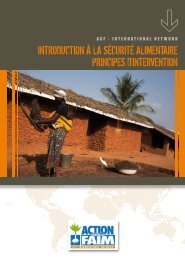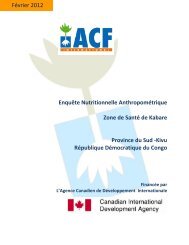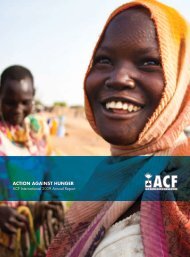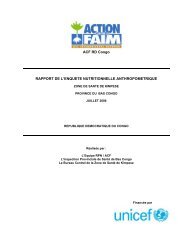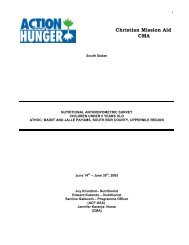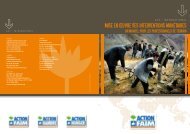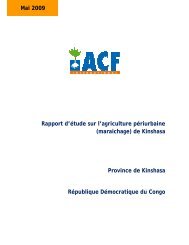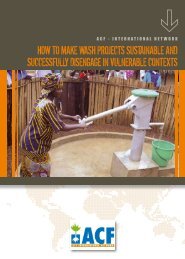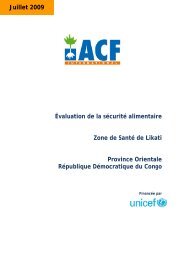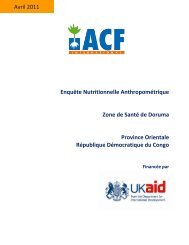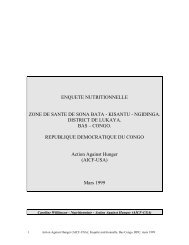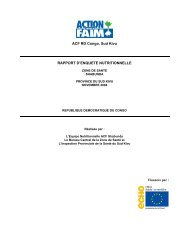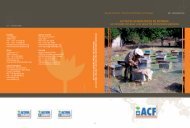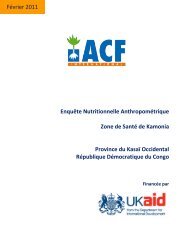Participatory Evaluation of our 2008 - Action Against Hunger
Participatory Evaluation of our 2008 - Action Against Hunger
Participatory Evaluation of our 2008 - Action Against Hunger
You also want an ePaper? Increase the reach of your titles
YUMPU automatically turns print PDFs into web optimized ePapers that Google loves.
24. FAO cannot be relied upon for seasonally appropriate delivery <strong>of</strong> in-kind programme inputs, but<br />
alternatives are available through increased collaboration with other farmer field school<br />
networks and NGOs who could <strong>of</strong>fer the same inputs with less delay.<br />
25. Donor funding cycles and procurement procedures have proven counterproductive to<br />
maximising seasonally strategic implementation.<br />
C. Conclusions<br />
1. Farmer field schools were an appropriate intervention within ACF’s <strong>2008</strong> Uganda country<br />
strategy and its food security and livelihoods programming therein.<br />
2. The programme was similarly appropriate for participating returnee households with respect to<br />
their already having re-established production and shifted away from livelihood strategies<br />
based on camp provisions affecting food, income, and expenditure.<br />
3. The ACF FFS groups were well mobilised and appeared to have embraced practices promoted<br />
through the programme, but information management was weak throughout, from monitoring<br />
and reporting to record keeping and photography.<br />
4. Programme impact on household food security and livelihoods cannot be proven but<br />
nonetheless appears evident on the basis <strong>of</strong> qualitative analysis and triangulated proxy<br />
indicators.<br />
5. Future FFS programme impact could be increased through a longer programme working with<br />
full production cycles, increased emphasis on complementary activities, and enhanced<br />
participation and experimentation.<br />
6. Opejal parish in Okwang sub-county (Lira) appears to have the worst food security and<br />
livelihood situation among the three programme areas. They have less savings in their group<br />
bank account, the fewest additional physical assets created during the programme, and<br />
directed a greater proportion <strong>of</strong> their expenditure to household items and food and debt loan<br />
payments compared with the groups in Aceno and Oyoro. Their crop production and<br />
subsequent income was similarly less, although their proportion <strong>of</strong> income from own livestock is<br />
higher.<br />
D. Recommendations<br />
1. The framework used to structure this evaluation should be utilised as a foundation to<br />
developing a logframe for the next programme cycle. The evaluation framework provides a<br />
structure for improved programme design and planning based on a logframe. Revision will be<br />
necessary at all levels (goal, objective, outputs), but the indicators will require particular<br />
attention. With a more strategic planning process, programme data could achieve a better<br />
balance <strong>of</strong> quantitative and qualitative analysis than what has been possible to date. Fewer<br />
indicators will also help streamline future M&E. This will be preferable to the abundance <strong>of</strong><br />
indicators used to triangulate findings in this evaluation. Regarding behavi<strong>our</strong> change, FFS<br />
groups themselves should be consulted to identify indicators that will be more revealing <strong>of</strong><br />
programme impact than the more standard (but less informative) aggregates like ‘number <strong>of</strong><br />
groups formed’ or ‘number <strong>of</strong> participants trained’.<br />
2. Baseline data collection must precede programme implementation so that monitoring<br />
and evaluation can be more strategically focused, ensuring that data collection fulfils<br />
specific information and reporting needs. Baseline data collection should be undertaken<br />
once facilitators have completed their FFS training, participant selection has concluded, and<br />
groups have been established. Data should be limited to the strategic minimum required to<br />
fulfil all programme indicators and any other specific information needs (for internal/external<br />
reporting).<br />
3. Baseline data collection must include production levels for study/commercial crops<br />
specific to each season and location, even if based on participant estimates <strong>of</strong> the<br />
previous year or expectations based on typical seed rate and acreage. Without such data<br />
<strong>Action</strong> <strong>Against</strong> <strong>Hunger</strong> Uganda - 7 - Farmer Field School <strong>Evaluation</strong>



